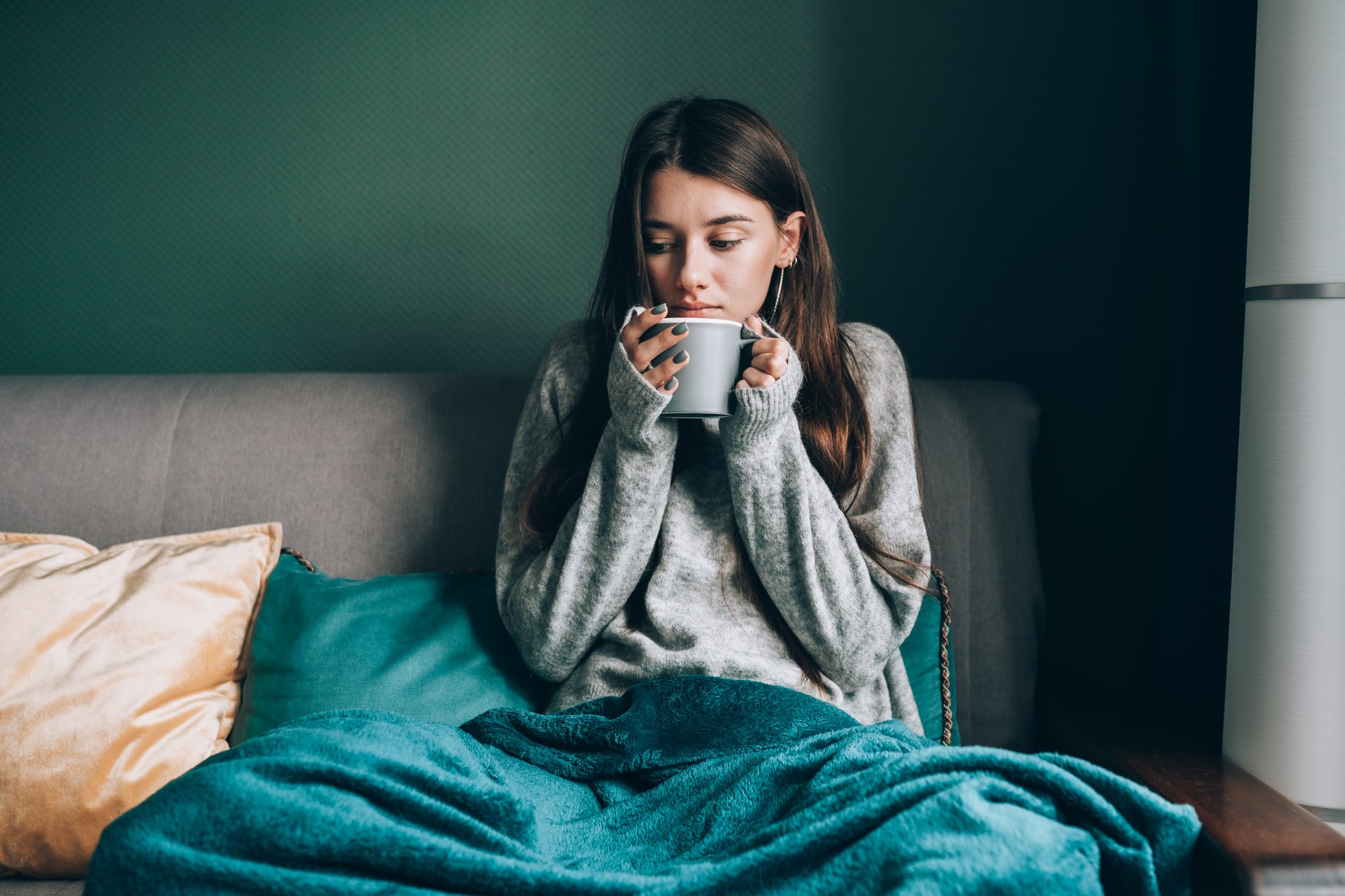 Image Source: Getty / Olga Rolenko
Image Source: Getty / Olga Rolenko
Dealing with a nighttime cough that’s costing you sleep? You’re not alone. Winter can be a hotbed for illness, which means good quality rest is more important than ever. But according to MDs, bedtime is actually a common trigger for coughing storms (especially if you don’t know what to do about it). From the positioning of your pillow to the amount of moisture in the air, there’s many reasons why coughing gets worse at night. Luckily, experts say there are ways to find a little reprieve.
In order to stop uncontrollable coughing at night, we dug into the root of the problem, asking doctors to explain why coughing gets worse in the evening (and spoiler alert: not every situation is exactly the same). Once you understand the likely reason for your cough, it may be easier to figure out a fix. For some, that may mean investing in cough suppressants and a new humidifier. In other, more severe cases, it could be time for medical intervention.
To figure out where to start, our doctors shared their best recommendations for coughs that get worse at night. This includes tried-and-true advice to reduce symptoms leading up to bedtime, and tips for creating a more restful sleeping space. Read on to learn how to stop dry coughing at night, set yourself up for better sleep, and recover faster than ever.
Why Is Coughing Worse at Night?
Your cough may be worsening at night for a number of reasons. Some have to do with your own body, while others involve the world around you. Take a look at some of the most common culprits:
Sleeping Position
One of the main reasons your cough is worse at night is because of the way your body is positioned in bed, says Akua Ampadu, MD, board-certified internal medicine physician and advisory board member for POPSUGAR’s condition center. While sinus drainage is not thought to be dependent on your exact sleeping position, lying flat on your back does exacerbate things like post nasal drip, which tends to increase coughing. Dr. Ampadu adds that supine sleeping positions also allow stomach acid to enter the esophagus, which can result in acid reflux and worsen your cough.
Postnasal Drip
Think of post nasal drip as the excess gunk that drains from your nose and down your throat, tickling the hair-like cilia that keeps mucus moving. “Mucus within the respiratory tract — from post nasal drip or the upper respiratory tract — can pool into the back of the throat, causing you to cough,” Dr. Ampadu tells POPSUGAR. Along with nighttime coughing, the excess mucus can cause you to feel hoarse, or leave you with a sore throat.
Asthma
Asthma also tends to flare up at night, which can result in difficulty breathing, wheezing, and coughing, says Payel Gupta, MD, immunologist and medical director of LifeMD. This is due to inflamed and narrowed airways, triggered by asthma, which make it harder for air to flow out when you breathe, according to the National Heart, Lung, and Blood Institute.
Environment
Other factors you may want to pay attention to are environmental, including dry air, allergens, and mold. Especially in the winter, cold weather can irritate the throat and dehydrate your nasal passages, while seasonal allergies and airborne irritants often lead to excess mucus and post nasal drip, according to research from Harvard Medical School. This includes mold allergies, which can lead to red eyes, chest tightness, and a persistent cough year-round, per the Cleveland Clinic. Smoke also makes coughing worse at night, so experts recommend keeping it out of the bedroom.
Respiratory Conditions
Dr. Ampadu says underlying conditions like emphysema, bronchitis, or even heart failure can also explain why coughing gets worse at night. Without proper treatment, these coughs may sound slightly different. The Cleveland Clinic describes a the cough as a”whistling or rattling sound” when associated with bronchitis and a hollow sound that can be heard through a stethoscope in people with emphysema.
Medications
Certain medications may be the reason why your cough gets worse at nighttime. The Cleveland Clinic reports that birth control and blood pressure drugs can increase post nasal drip, which can trigger nighttime coughing. While the American Academy of Allergy, Asthma & Immunology says angiotensin-converting enzyme (ACE) inhibitors, beta-blockers, and non-steroidal anti-inflammatory drugs (NSAIDs) can cause asthma symptoms to flare up —nighttime coughs included.
How to Stop Coughing at Night
Rest assured, for all the potential reasons your cough may get worse at night, there are also treatments to help. The following are some expert-approved ways to address the root cause of nighttime coughing:
Change Your Sleeping Position
For post nasal drip, Dr. Ampadu suggests elevating your head at least 30 degrees, which can usually be done with the help of an extra pillow. You might also consider turning to the side so that mucus can’t pool as easily.
Opt For Over-the-Counter Solutions
“Post nasal drip can be controlled with the proper use of nasal sprays, but they need to be used as prescribed in order to help,” Dr. Gupta says. Over-the-counter saline nasal sprays with sodium chloride are ideal, since they can rinse mucus out of the sinuses and nasal passages. For people with severe allergies, steroid nasal sprays are sometimes prescribed.
To quell coughing further, Dr. Ampadu says you may want to use an over-the-counter antitussive medication (meaning cough suppressants like Robitussin or Mucinex).
Cut Out Certain Food and Drink
If you suspect acid reflux is making your cough worse at night, Dr. Gupta advises patients to stop eating and drinking alcohol one to two hours before bedtime, avoiding anything excessively greasy, spicy, or caffeinated. You can be even more proactive about your cough by staying hydrated throughout the day to prevent dry nasal passages.
Switch Up Your Nighttime Routine
For a more restful sleep, consider taking a hot shower to clear up airways, or applying a topical ointment like Vicks VapoRub. Dr. Ampadu says a humidifier can also be helpful to combat dry air and allow for less nighttime coughing.
When Should You Seek Medical Treatment?
“If your cough is not improving or worsening, then it is time to seek medical care,” Dr. Gupta says. As far as a specific timeline, Dr. Ampadu says persistent coughing for three weeks is a red flag. Other warning signs to seek help include fevers, chills, night sweats, fatigue, unintentional weight loss, bloody or discolored mucus, and difficulty breathing.
Image Source: Getty / Olga Rolenko
